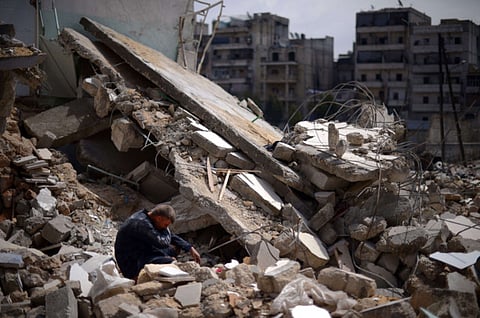The smoke that obscures the fire in Syria
The Syrian revolution should uphold its ethical superiority

Maybe a few admire him, but many can learn from him. In the mid 1970s, prior to launching their armed revolution against the dictator, Anastasio Somoza of Nicaragua, the Sandinista leaders asked for support from the Cuban leader, Fidel Castro. He replied: “The best way to support you is not to support you.”
He explained that if Cuba supported them from the beginning, it would have provided a strong pretext for the US to tar their revolution as Cuban interference in Nicaragua and send its troops to derail it. Somoza would gain more time in power.
The lesson is clear when it comes to Syria: Rushing to support the revolution as a Sunni revolt against Alawite dominance has greatly damaged the cause. Arabs could have supported Syrians by many means, but certainly not by casting a revolution for freedom and justice in a sectarian frame. The result is clear: Support for both sides — the regime and rebels — has been along sectarian lines.
This was the first deadly mistake. Many will say that this is just a side-effect of a spontaneous mass explosion. This is wrong. We are witnessing greater Al Qaida influence in some parts of the liberated cities and an escalation in human rights violations. This clearly shows that some of those fighting in Syria are no different from the regime.
The latest incident was the killing of a pro-Bashar Al Assad cleric in Aleppo, whose body was dragged in the streets. This is not an act of freedom fighters. The revolution should uphold its ethical superiority under all circumstances. It can only happen under a strong and unified command. It is obvious that the Syrian revolution lacks such a command. That is the second mistake, which has not been rectified to date.
The question is: Are these mistakes spontaneous? Many would agree that these could have been expected in the beginning of the revolution. However, after two years they are not justified.
Furthermore, why does the Syrian opposition seem unable to form a strong leadership or to elect a charismatic leader? Those who are fighting inside Syria cannot point their finger at one representative.
Thus one major problem for the opposition outside Syria is: Who can speak on behalf of the Syrian people? Why should such a problem persist even after two years?
The answer may come from the recent statements made by some Syrian opposition figures and the Free Syrian Army (FSA), accusing the Syrian Muslim Brotherhood of attempting to dominate the opposition and exclude other opposition figures and parties.
Incomprehensible
This is the smoke that obscures the fire inside Syria, unfortunately. I wonder, as many others do, about the Syrian opposition leadership. In particular, why have they rotated three leaders thrice in two years: Veteran opposition leader and Sorbonne professor Burhan Galioun, then Abdul Basit Sida and recently the Damascene moderate Islamist Muath Al Khatib? The “six-month condition” is incomprehensible for a revolution such as the one in Syria. The result is clear: We are witnessing the weak performance of the opposition, due to its fragmented status.
What can a president of the Syrian opposition do in six months? The reaction to Al Khatib’s call for negotiations with the regime, some weeks ago, will answer that question. The criticism came mainly from those who were close to the Muslim Brotherhood and the Salafists outside Syria and implicitly from Turkey and Qatar, while those who welcomed it were ordinary Syrian citizens inside Syria. This may explain some of the forgotten facts when it comes to leading people in an armed conflict or revolution.
While Al Khatib was motivated by the suffering of Syrian people trapped in the conflict, such a move could have achieved many points. Politically it was a test of the intentions of the regime and could have burdened the regime with more ethical and political pressure. In human terms, it could have given the people a chance to breathe, and relief, even if for a while.
Finally, it could have given the opposition a chance to realign its position. Negotiations with dictators is not new and not a sin, but it seems that being the head of the Syrian opposition means nothing more than being a speaker, while others take the real decisions behind the scenes. This is exactly what the statement of the FSA pointed out.
This fragmented status of the opposition is not a mistake, but a deliberate choice that has been reflected in consequences on the battlefield. Maybe that is why many say that the collapse of the Syrian regime is not imminent.
Mohammad Fadhel is a Bahraini writer and media consultant based in Dubai.
Sign up for the Daily Briefing
Get the latest news and updates straight to your inbox



